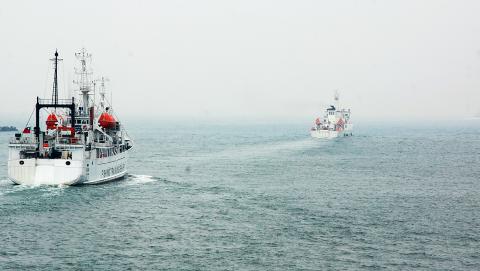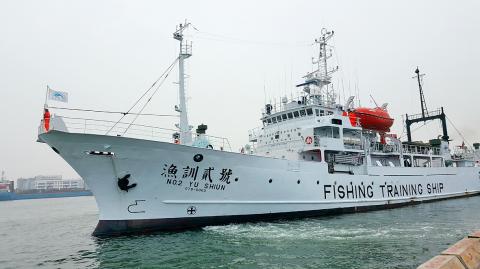Two patrol boats yesterday left Kaohsiung for international waters near the Okinotori atoll in the Western Pacific in response to a directive from President Ma Ying-jeou (馬英九) to protect Taiwanese fishing boats operating in the area.
The deployment of a Coast Guard Administration (CGA) ship and one belonging to the Fisheries Agency came after a Taiwanese fishing boat, the Tung Sheng Chi No. 16, was seized on Monday last week by the Japan Coast Guard while operating in waters about 150 nautical miles (228km) from the uninhabited atoll.
The boat and its crew were released the following day after the boat’s owner paid a security deposit demanded by Japanese authorities.

Photo: CNA
Japan claims a 200 nautical mile exclusive economic zone around the atoll, which it says is an island, but which Taiwan says is a reef and therefore is not entitled to anything more than a 500m “security zone.”
Taiwan lodged a protest with Japan and Ma instructed government agencies to step up protection for fishermen operating in waters near the atoll.
Coast guard officials told a news conference before the ships departed that the agency would adopt the principles of no evasion, no confrontation and no provocation in its protection of Taiwanese fishing boats operating in the area.

Photo: Hung Chen-hung, Taipei Times
However, CGA Deputy Director-General Yao Chou-tien (姚洲典) said that Taiwan would respond should Japan use water cannons or take unfriendly action against Taiwanese fishing vessels, adding that he hopes protection of fishing rights would be enforced peacefully and rationally.
The coast guard vessel is equipped with automatic cannons and machine guns.
Yao said the deployment conforms with the principle of freedom of fishing on the high seas stipulated in the UN Convention on the Law of the Sea and is part of the CGA’s routine patrol missions.
The two patrol boats have LED display boards showing a scrolling message: “We are exercising the freedom of fishing. Do not disturb,” in Chinese, English and Japanese.
It is expected to take them three to five days to reach the atoll.
Yao said the fishery protection program would last for one month.
There are 100 to 200 fishing boats from the port of Suao (蘇澳) in Yilan County and Pingtung County’s Donggang (東港) and Siaoliouciou (小琉球) operating in the area, according to Lin Ding-rong (林頂榮), director of the Fisheries Agency’s Deep Sea Fisheries Division.

NATIONAL SECURITY THREAT: An official said that Guan Guan’s comments had gone beyond the threshold of free speech, as she advocated for the destruction of the ROC China-born media influencer Guan Guan’s (關關) residency permit has been revoked for repeatedly posting pro-China content that threatens national security, the National Immigration Agency said yesterday. Guan Guan has said many controversial things in her videos posted to Douyin (抖音), including “the red flag will soon be painted all over Taiwan” and “Taiwan is an inseparable part of China,” while expressing hope for expedited “reunification.” The agency received multiple reports alleging that Guan Guan had advocated for armed reunification last year. After investigating, the agency last month issued a notice requiring her to appear and account for her actions. Guan Guan appeared as required,

Japan and the Philippines yesterday signed a defense pact that would allow the tax-free provision of ammunition, fuel, food and other necessities when their forces stage joint training to boost deterrence against China’s growing aggression in the region and to bolster their preparation for natural disasters. Japan has faced increasing political, trade and security tensions with China, which was angered by Japanese Prime Minister Sanae Takaichi’s remark that a Chinese attack on Taiwan would be a survival-threatening situation for Japan, triggering a military response. Japan and the Philippines have also had separate territorial conflicts with Beijing in the East and South China

A strong cold air mass is expected to arrive tonight, bringing a change in weather and a drop in temperature, the Central Weather Administration (CWA) said. The coldest time would be early on Thursday morning, with temperatures in some areas dipping as low as 8°C, it said. Daytime highs yesterday were 22°C to 24°C in northern and eastern Taiwan, and about 25°C to 28°C in the central and southern regions, it said. However, nighttime lows would dip to about 15°C to 16°C in central and northern Taiwan as well as the northeast, and 17°C to 19°C elsewhere, it said. Tropical Storm Nokaen, currently

PAPERS, PLEASE: The gang exploited the high value of the passports, selling them at inflated prices to Chinese buyers, who would treat them as ‘invisibility cloaks’ The Yilan District Court has handed four members of a syndicate prison terms ranging from one year and two months to two years and two months for their involvement in a scheme to purchase Taiwanese passports and resell them abroad at a massive markup. A Chinese human smuggling syndicate purchased Taiwanese passports through local criminal networks, exploiting the passports’ visa-free travel privileges to turn a profit of more than 20 times the original price, the court said. Such criminal organizations enable people to impersonate Taiwanese when entering and exiting Taiwan and other countries, undermining social order and the credibility of the nation’s